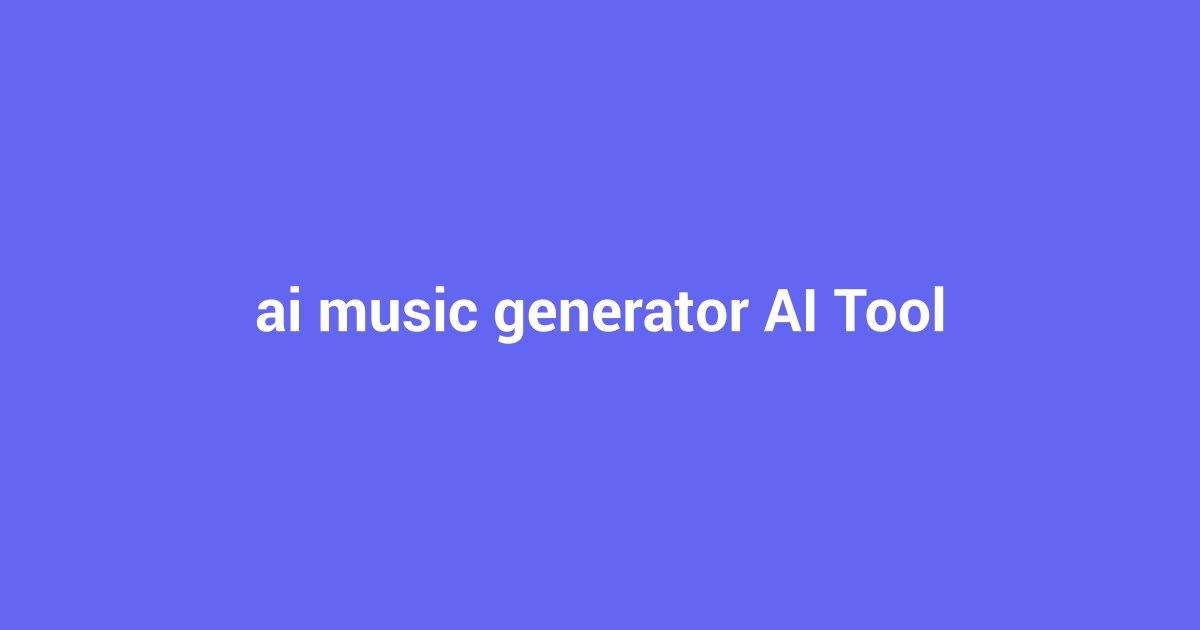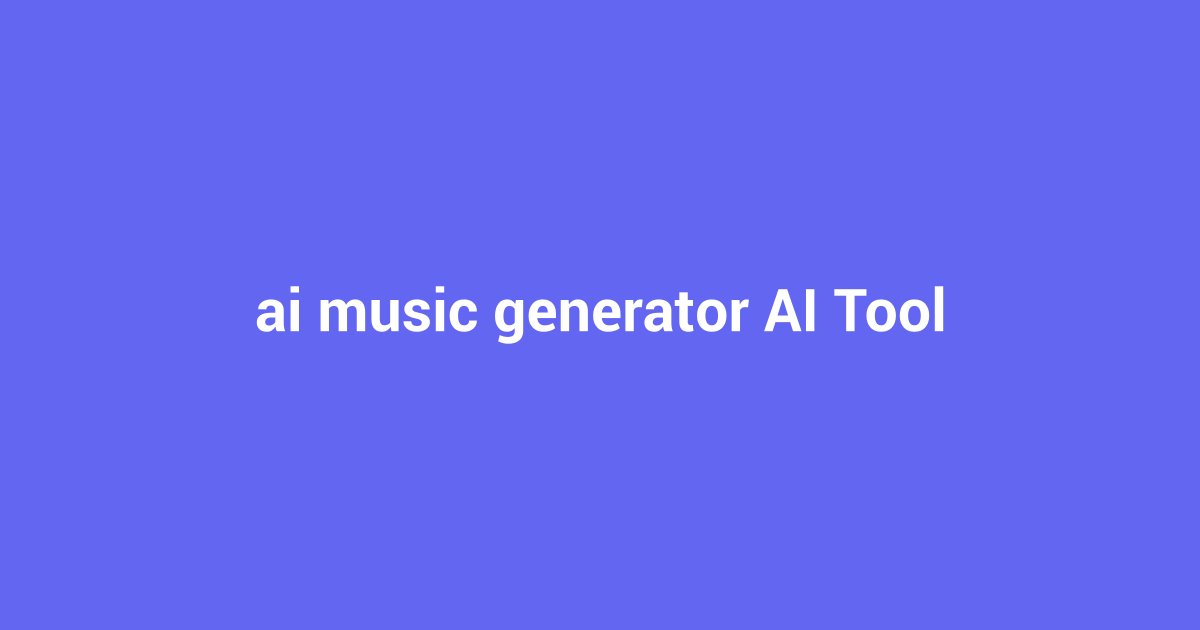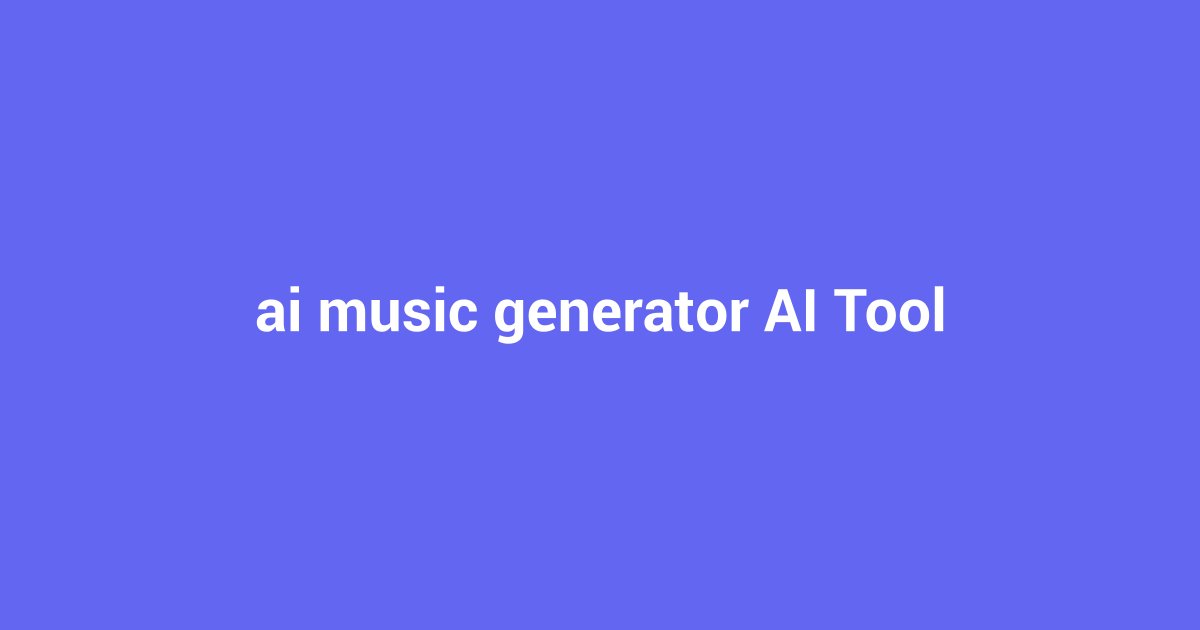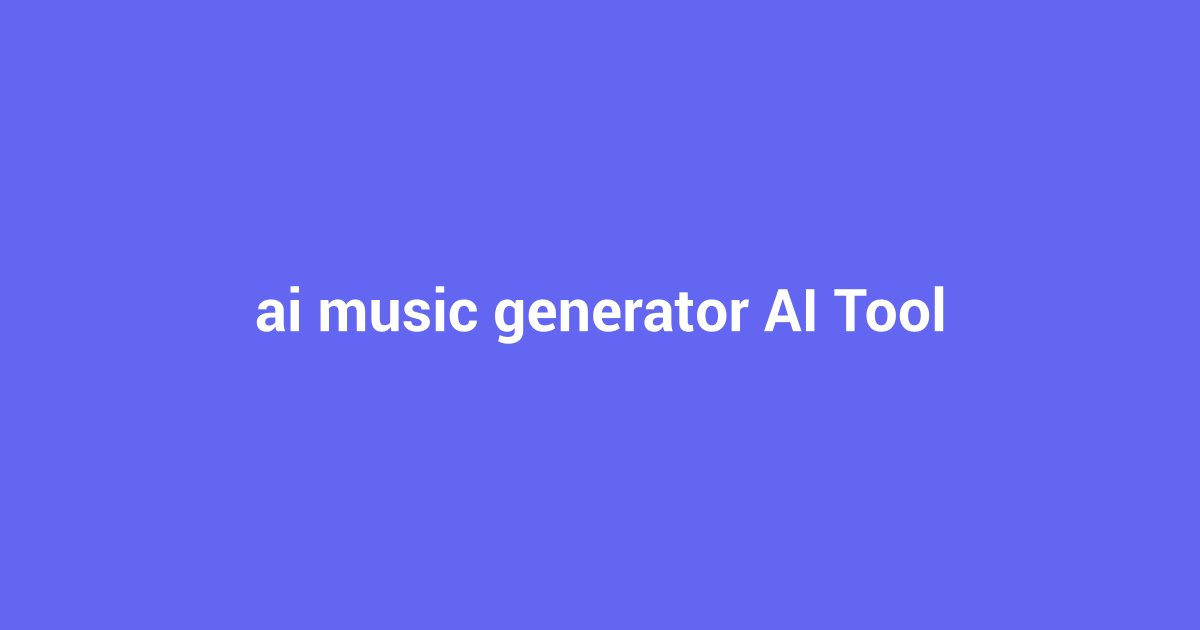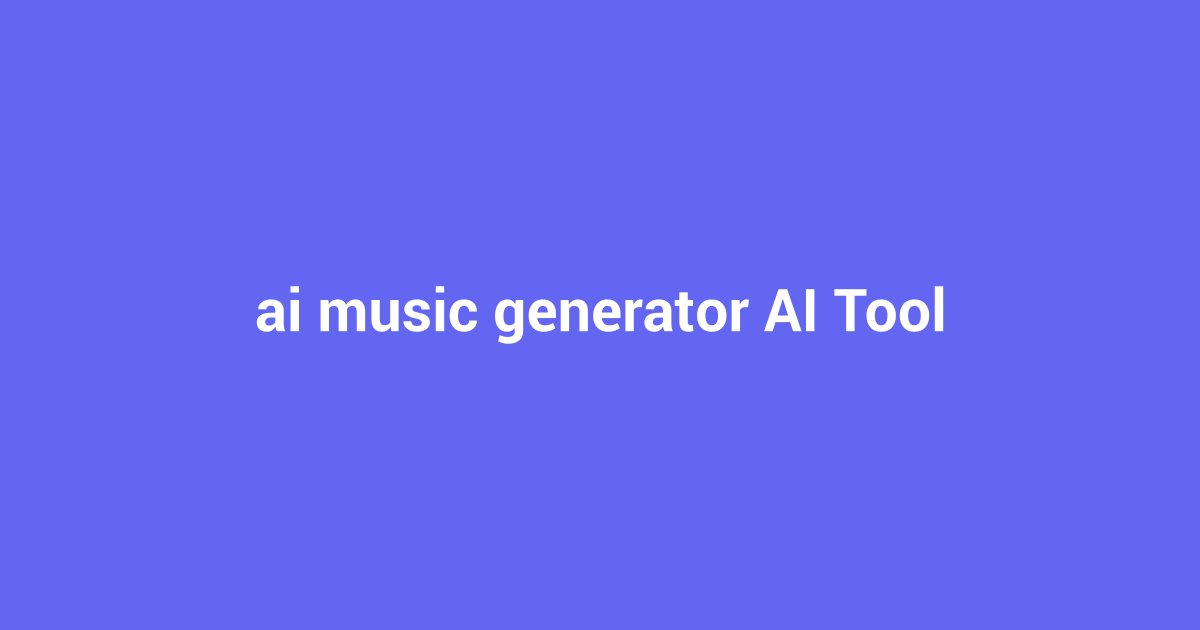Introduction
The landscape of creative industries is undergoing a seismic shift, largely driven by advancements in artificial intelligence. Among the most exciting and impactful innovations is the rise of the AI Music Generator. This cutting-edge AI tool is transforming how music is composed, produced, and consumed, moving beyond simple novelty to become an indispensable asset across various sectors. For businesses, content creators, and even individual artists, understanding the capabilities and real-world applications of this technology is no longer optional – it's essential. This article delves into the practical use cases and industry impact of AI Music Generators, highlighting how they offer unprecedented efficiency, foster new avenues of creativity, and enhance accessibility to high-quality audio production in 2024.
What is AI Music Generator?
An AI Music Generator is a sophisticated AI tool that leverages machine learning and deep learning algorithms to compose original musical pieces. Unlike traditional digital audio workstations (DAWs) that require extensive human input for every note and instrument, this AI software can generate complete tracks from scratch based on user-defined parameters. Users typically input preferences such as genre (e.g., classical, electronic, hip-hop), mood (e.g., uplifting, melancholic, intense), desired instrumentation, and track length. The artificial intelligence then processes these inputs, drawing from vast datasets of existing Music, to create unique compositions. For example, a video editor might need a 60-second upbeat corporate jingle, and an AI Music Generator can produce several variations within minutes, offering options to restructure sections or alter specific elements like the bassline or drum pattern. This capability makes it an incredibly powerful and versatile asset for rapid content creation.
Key Features and Benefits
- Rapid Composition: One of the most significant advantages is the ability to generate full, high-quality musical tracks in a fraction of the time it would take a human composer. This speed is invaluable for projects with tight deadlines, allowing for quick iteration and experimentation without extensive time investment.
- Genre Versatility: Modern AI Music Generators are trained on diverse musical datasets, enabling them to compose in virtually any genre imaginable. From cinematic orchestral scores to lo-fi hip-hop beats, ambient soundscapes, or upbeat pop tracks, users can select and blend styles to perfectly match their project's needs.
- Customization & Restructuring: Beyond initial generation, these AI tools often provide extensive options for customization. Users can restructure entire tracks, moving sections like verses or choruses, altering tempos, changing key signatures, or fine-tuning individual instrument volumes and effects, offering a high degree of creative control.
- Cost-Effectiveness: For many businesses and creators, licensing existing music or hiring professional composers can be prohibitively expensive. AI Music Generators provide a cost-effective alternative, significantly reducing expenses associated with music production, making custom scores accessible to a broader audience.
Use Cases and Applications
The practical use cases and applications of AI Music Generator technology are expanding rapidly across numerous industries. Here are some compelling real-world examples:
- Content Creation for Digital Media: Podcasters, YouTubers, and social media influencers constantly need background music, intros, and outros. An AI Music Generator allows them to quickly produce unique, royalty-free tracks tailored to their content's tone and length. For instance, a travel vlogger can generate a cheerful, 3-minute instrumental piece for their latest adventure video, ensuring their content stands out without copyright concerns or high licensing fees. This is a massive time-saver and creativity booster for the ever-growing creator economy in 2024.
- Marketing and Advertising Campaigns: Brands require distinctive jingles, ad scores, and promotional music that resonate with their target audience. Instead of relying on generic stock music or expensive custom compositions, marketing teams can use an AI tool to generate multiple variations of a brand jingle, test different emotional responses, and iterate rapidly. A consumer electronics company, for example, could generate an upbeat, futuristic track for a new product launch commercial, perfectly aligning the audio with their brand identity and campaign goals. These case studies show significant ROI.
- Game Development: Video games demand dynamic and immersive soundtracks that adapt to gameplay. AI software can generate adaptive background Music that changes based on in-game events, player actions, or environmental shifts. Imagine a horror game where the ambient music subtly intensifies as the player approaches danger, or a puzzle game where the melody evolves with each solved challenge. This capability provides game developers with unparalleled flexibility and efficiency in creating rich, responsive audio experiences, significantly enhancing player engagement without manual composition for every scenario.
Getting Started
Diving into the world of AI Music Generator tools is surprisingly straightforward. Here’s a simple guide to help beginners:
- Choose Your Platform: Begin by selecting an accessible AI Music Generator AI software. Popular options often offer free trials or freemium models, allowing you to experiment before committing. Research platforms that align with your specific needs, considering factors like genre variety, customization options, and ease of use. Many tools are web-based, requiring no software installation, making them highly convenient for immediate use. Look for interfaces that are intuitive and provide clear guidance for new users.
- Define Your Parameters: Once you've chosen your platform, the next step is to input your desired musical parameters. This is where you tell the AI tool what kind of Music you want. Specify the genre (e.g., cinematic, electronic, folk), mood (e.g., calm, energetic, mysterious), instrumentation (e.g., piano, drums, strings), and the desired length of the track. Some advanced generators also allow you to upload reference tracks or text prompts to guide the AI's composition, ensuring the output is closely aligned with your vision.
- Generate and Refine: With your parameters set, initiate the generation process. The AI Music Generator will then compose a unique piece of Music based on your specifications. Don't stop at the first output! Most platforms allow you to listen, make adjustments, and regenerate. Experiment with different settings, try minor tweaks to the mood or tempo, or even restructure sections of the track. This iterative process is key to refining the output until you achieve the perfect sound for your project.
Tips and Best Practices
- Start with Clear Prompts: The quality of your output heavily depends on the clarity and specificity of your input. Instead of just "happy music," try "upbeat, acoustic folk music with a driving rhythm for a travel vlog." The more detailed your prompt, the better the AI tool can understand and execute your vision.
- Iterate and Experiment: Don't expect perfection on the first try. Use the AI Music Generator as a creative partner. Generate multiple versions, tweak parameters, and combine elements from different outputs. Experiment with varying genres, instruments, and moods to discover unexpected and inspiring results. This iterative process is where the true power of this technology shines.
- Understand Copyright & Licensing: If you plan to use AI-generated music commercially, always check the platform's terms of service regarding copyright and licensing. While many offer royalty-free options, some may have specific attribution requirements or tiered licensing models. Ensuring compliance is crucial for all commercial use cases, especially as the legal landscape around AI-generated content continues to evolve in 2024.
Pros and Cons
Advantages
- Unprecedented Speed and Efficiency: AI Music Generators can produce high-quality tracks in minutes, drastically cutting down production time for content creators, marketers, and developers. This allows for rapid prototyping and iteration, making it a game-changer for projects with tight deadlines.
- Accessibility and Cost-Effectiveness: This AI software democratizes music creation, making custom scores accessible to individuals and small businesses who might not have the budget for professional composers or extensive music licensing. It lowers the barrier to entry for high-quality audio production.
Limitations
- Lack of Human Nuance and Emotional Depth: While AI can mimic human composition, it often struggles to infuse the subtle emotional depth, unique storytelling, or unexpected creative flourishes that a human composer brings. The output can sometimes feel generic or lack a distinctive "soul."
- Potential for Generic Sound: Without careful guidance and refinement, AI-generated music can sometimes sound repetitive or formulaic. Over-reliance on default settings can lead to a lack of originality, requiring users to actively engage in the customization and restructuring features to achieve truly unique results.
Conclusion
The AI Music Generator is far more than a passing trend; it's a powerful AI tool that is fundamentally reshaping how we approach Music creation. From empowering independent content creators to providing innovative solutions for marketing, gaming, and beyond, its real-world use cases are diverse and impactful. While the technology continues to evolve, addressing current limitations and expanding its creative capabilities, its core benefits of speed, accessibility, and cost-effectiveness are undeniable. For anyone involved in digital content, media production, or simply curious about the future of creativity, exploring an AI Music Generator in 2024 is a worthwhile endeavor. Don't miss out on this transformative innovation – start experimenting with an AI Music Generator today and unlock new dimensions of sound for your projects!


